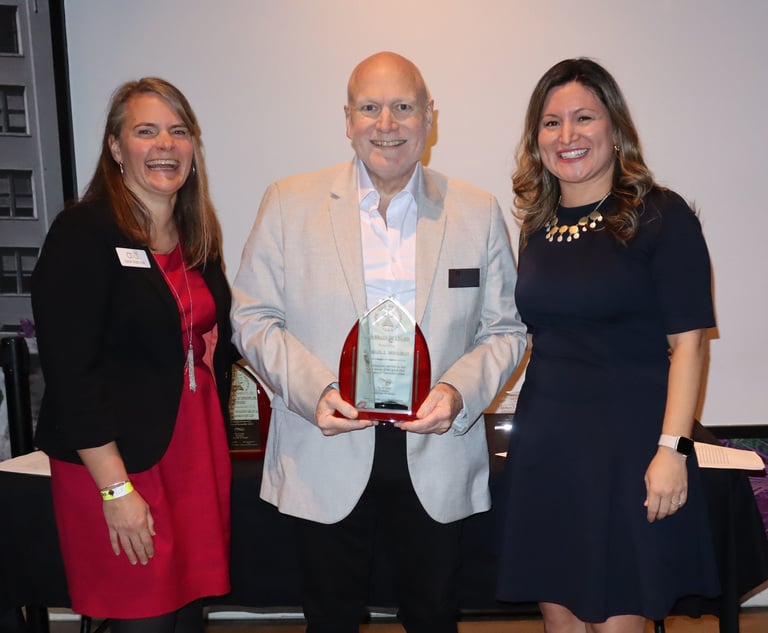May In-House Counsel Provide Legal Services Here If They Aren't Licensed in Georgia?
Before taking that in-house position in Georgia, an out-of-state lawyer should know the answer to this question.
December 01, 2017 at 02:30 PM
4 minute read
 Shutterstock
Shutterstock  Jonathan Hawkins (John Disney/ ALM)
Jonathan Hawkins (John Disney/ ALM) Fairly regularly, lawyers move to Georgia to begin new jobs as in-house counsel. Certain questions naturally will arise. To accept an in-house position and provide legal services in Georgia, does a lawyer have to become licensed here? What are the consequences, if any, of the in-house lawyer not having a Georgia license? What if the lawyer does not have an active license anywhere?
Before taking that in-house position in Georgia, an out-of-state lawyer should know the answers to those questions. Some possible consequences of providing legal services as an unlicensed in-house lawyer include criminal sanction for unauthorized practice of law, possible loss of the ability of the client to assert the attorney-client privilege, or reprimand, suspension or disbarment of the attorney.
Under certain circumstances, Georgia allows in-house counsel to perform legal services for their employers, even if they are not licensed in the state. The rationale for this license exception is that a lawyer's ability to represent her organizational client generally serves the interests of the employer and does not create an unreasonable risk to the client because it is well situated to assess the lawyer's qualifications and the quality of the lawyer's work.
Specifically, Georgia Rule of Professional Conduct 5.5(d) allows an in-house lawyer not admitted to practice law in Georgia to provide legal services for her employer if the following conditions are met:
- The lawyer must be authorized to practice law in a state or territory of the United States or the District of Columbia;
- The lawyer must not be disbarred or suspended from practice in any jurisdiction;
- The legal services are being provided to the lawyer's employer or its organizational affiliates; and
- The legal services being provided are not services for which a particular forum requires pro hac vice admission.
To fall under the Rule 5.5(d) license exception, in-house counsel must be authorized to practice in at least one jurisdiction. That means they cannot take inactive status, and they must pay their bar dues and complete their annual CLE requirements. Any lapse, unintentional or not, will open the lawyer up to the unauthorized practice of law.
An in-house counsel in Pennsylvania learned this the hard way. In that case, the in-house lawyer failed to maintain her annual CLE requirements and failed to pay her annual bar dues. The Pennsylvania bar initially placed her on inactive status for failing to meet the annual CLE requirements and later changed her status from inactive to administratively suspended. While on inactive status and administrative suspension, the in-house attorney was a “formerly admitted attorney” and was no longer authorized to practice law. Thus, during that time period, she engaged in the unauthorized practice of law. She was ultimately suspended from the practice of law for six months.
While Rule 5.5(d) allows an unadmitted in-house lawyer to provide legal services to its employer in Georgia, it explicitly does not allow the lawyer to provide personal legal services to the employer's officers or employees. Even without this express prohibition, conflicts would often prevent such representation anyway.
On occasion, an in-house counsel may be tasked with representing his corporate employer in litigation or at a deposition. If not actively licensed in Georgia, then the attorney cannot represent the client unless and until securing pro hac vice admission in the particular forum.
Some jurisdictions require an out-of-state licensed in-house lawyer to register with their employer's state bar association, but Georgia currently has no such rule. That said, in-house lawyers who provide legal services for employers here are still subject to the disciplinary authority of the State Bar of Georgia, so they should be familiar with the ethics rules and opinions here. See Ga. R. Prof'l Conduct 8.5(a).
Key Takeaways
If you are an out-of-state lawyer taking an in-house position with a company here in Georgia, remember to:
- Maintain an active license somewhere;
- Only provide legal services to your employer client;
- Know and comply with the Georgia ethics rules.
Jonathan E. Hawkins is a partner in the Atlanta firm of Krevolin & Horst. He represents clients in numerous business sectors in high-stakes complex commercial litigation and serves as outside general, business and ethics counsel to lawyers and law firms.
This content has been archived. It is available through our partners, LexisNexis® and Bloomberg Law.
To view this content, please continue to their sites.
Not a Lexis Subscriber?
Subscribe Now
Not a Bloomberg Law Subscriber?
Subscribe Now
NOT FOR REPRINT
© 2025 ALM Global, LLC, All Rights Reserved. Request academic re-use from www.copyright.com. All other uses, submit a request to [email protected]. For more information visit Asset & Logo Licensing.
You Might Like
View All
Jimmy Carter’s 1974 Law Day Speech: A Call for Lawyers to Do the Public Good
14 minute read
Slideshow: Jewish Bar Association of Georgia Marks 1st Year With Hanukkah Party

State Bar of Georgia Presents Access to Justice Pro Bono Awards
Trending Stories
- 1Two Wilkinson Stekloff Associates Among Victims of DC Plane Crash
- 2Two More Victims Alleged in New Sean Combs Sex Trafficking Indictment
- 3Jackson Lewis Leaders Discuss Firm's Innovation Efforts, From Prompt-a-Thons to Gen AI Pilots
- 4Trump's DOJ Files Lawsuit Seeking to Block $14B Tech Merger
- 5'No Retributive Actions,' Kash Patel Pledges if Confirmed to FBI
Who Got The Work
J. Brugh Lower of Gibbons has entered an appearance for industrial equipment supplier Devco Corporation in a pending trademark infringement lawsuit. The suit, accusing the defendant of selling knock-off Graco products, was filed Dec. 18 in New Jersey District Court by Rivkin Radler on behalf of Graco Inc. and Graco Minnesota. The case, assigned to U.S. District Judge Zahid N. Quraishi, is 3:24-cv-11294, Graco Inc. et al v. Devco Corporation.
Who Got The Work
Rebecca Maller-Stein and Kent A. Yalowitz of Arnold & Porter Kaye Scholer have entered their appearances for Hanaco Venture Capital and its executives, Lior Prosor and David Frankel, in a pending securities lawsuit. The action, filed on Dec. 24 in New York Southern District Court by Zell, Aron & Co. on behalf of Goldeneye Advisors, accuses the defendants of negligently and fraudulently managing the plaintiff's $1 million investment. The case, assigned to U.S. District Judge Vernon S. Broderick, is 1:24-cv-09918, Goldeneye Advisors, LLC v. Hanaco Venture Capital, Ltd. et al.
Who Got The Work
Attorneys from A&O Shearman has stepped in as defense counsel for Toronto-Dominion Bank and other defendants in a pending securities class action. The suit, filed Dec. 11 in New York Southern District Court by Bleichmar Fonti & Auld, accuses the defendants of concealing the bank's 'pervasive' deficiencies in regards to its compliance with the Bank Secrecy Act and the quality of its anti-money laundering controls. The case, assigned to U.S. District Judge Arun Subramanian, is 1:24-cv-09445, Gonzalez v. The Toronto-Dominion Bank et al.
Who Got The Work
Crown Castle International, a Pennsylvania company providing shared communications infrastructure, has turned to Luke D. Wolf of Gordon Rees Scully Mansukhani to fend off a pending breach-of-contract lawsuit. The court action, filed Nov. 25 in Michigan Eastern District Court by Hooper Hathaway PC on behalf of The Town Residences LLC, accuses Crown Castle of failing to transfer approximately $30,000 in utility payments from T-Mobile in breach of a roof-top lease and assignment agreement. The case, assigned to U.S. District Judge Susan K. Declercq, is 2:24-cv-13131, The Town Residences LLC v. T-Mobile US, Inc. et al.
Who Got The Work
Wilfred P. Coronato and Daniel M. Schwartz of McCarter & English have stepped in as defense counsel to Electrolux Home Products Inc. in a pending product liability lawsuit. The court action, filed Nov. 26 in New York Eastern District Court by Poulos Lopiccolo PC and Nagel Rice LLP on behalf of David Stern, alleges that the defendant's refrigerators’ drawers and shelving repeatedly break and fall apart within months after purchase. The case, assigned to U.S. District Judge Joan M. Azrack, is 2:24-cv-08204, Stern v. Electrolux Home Products, Inc.
Featured Firms
Law Offices of Gary Martin Hays & Associates, P.C.
(470) 294-1674
Law Offices of Mark E. Salomone
(857) 444-6468
Smith & Hassler
(713) 739-1250







